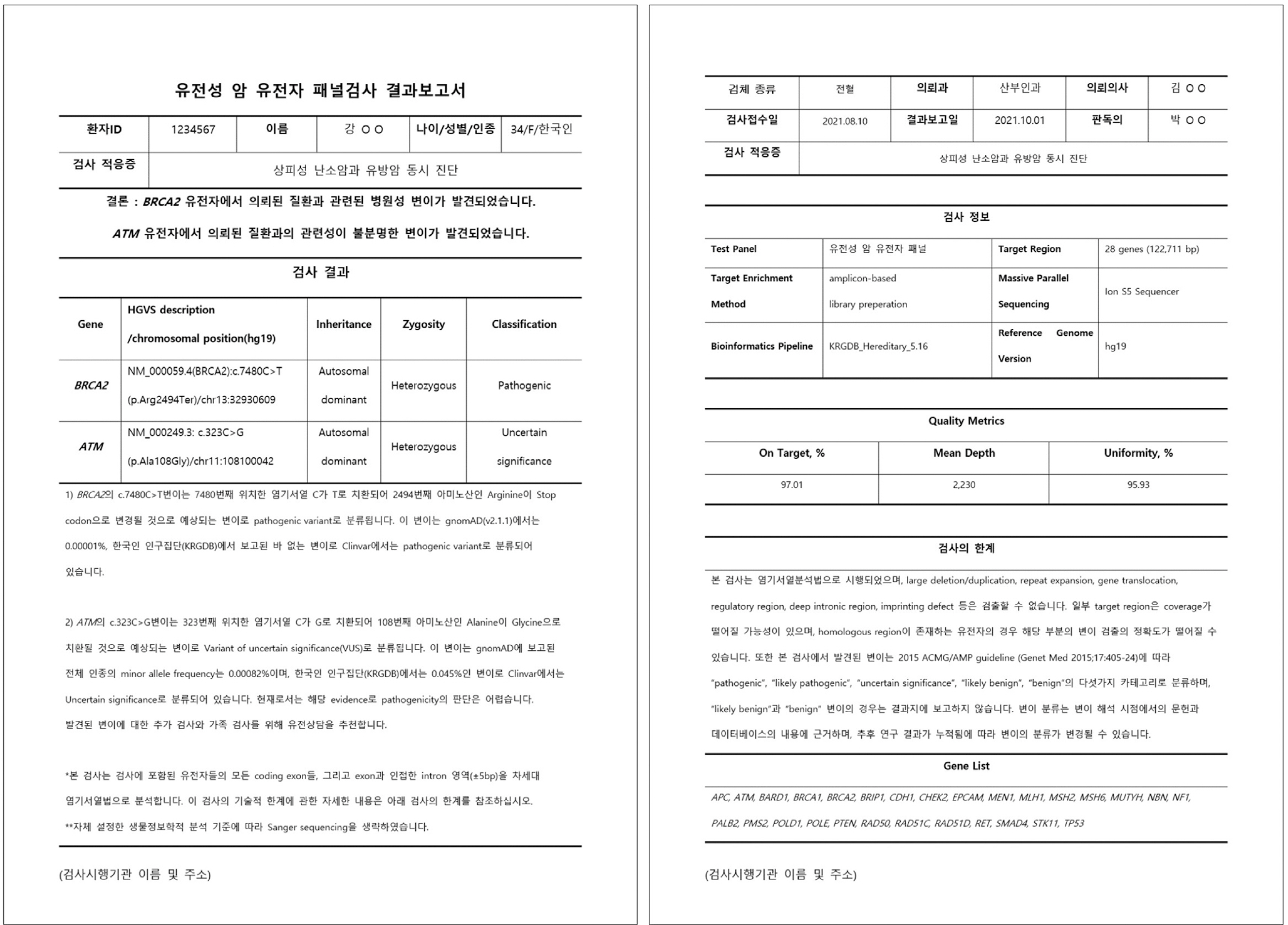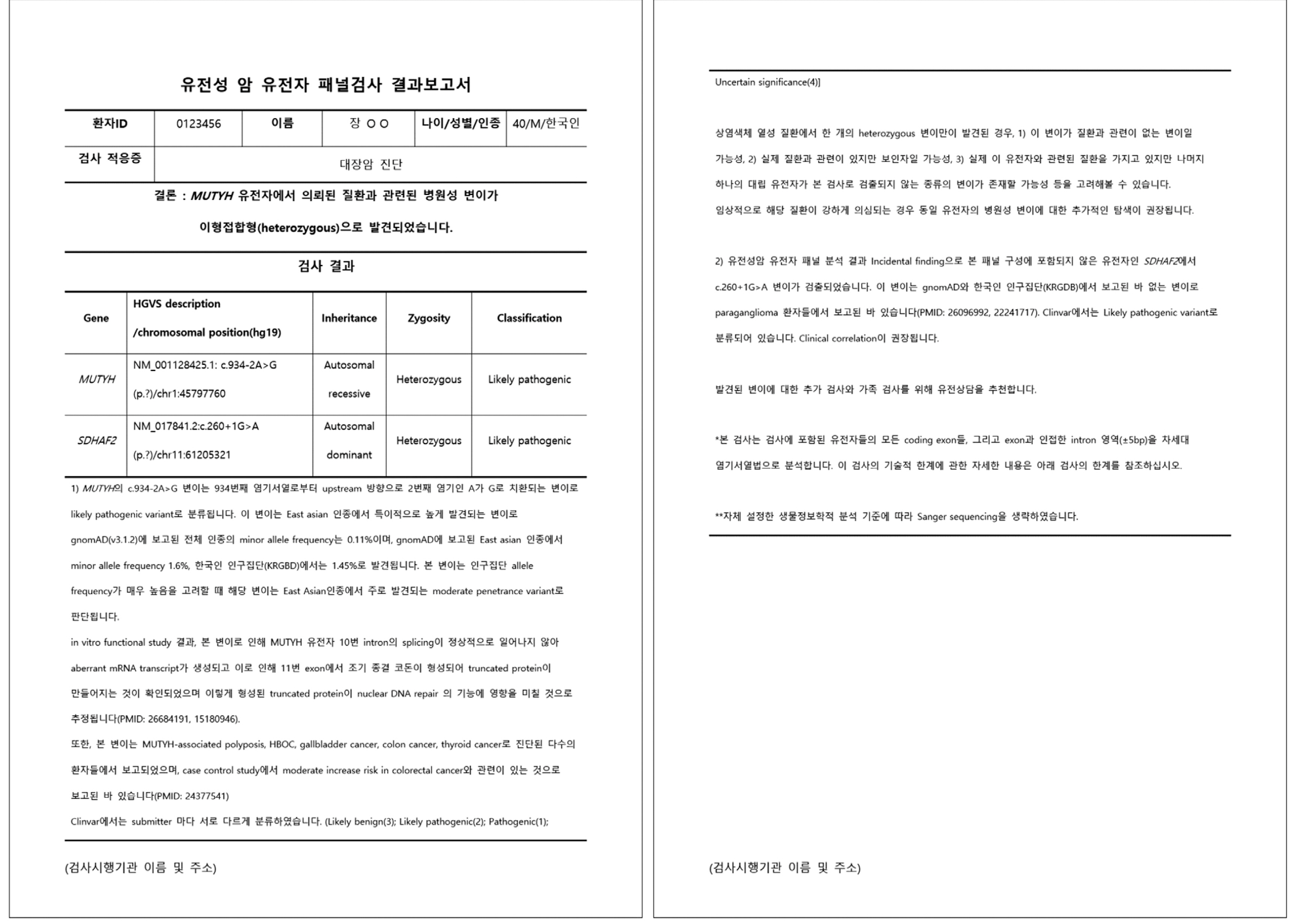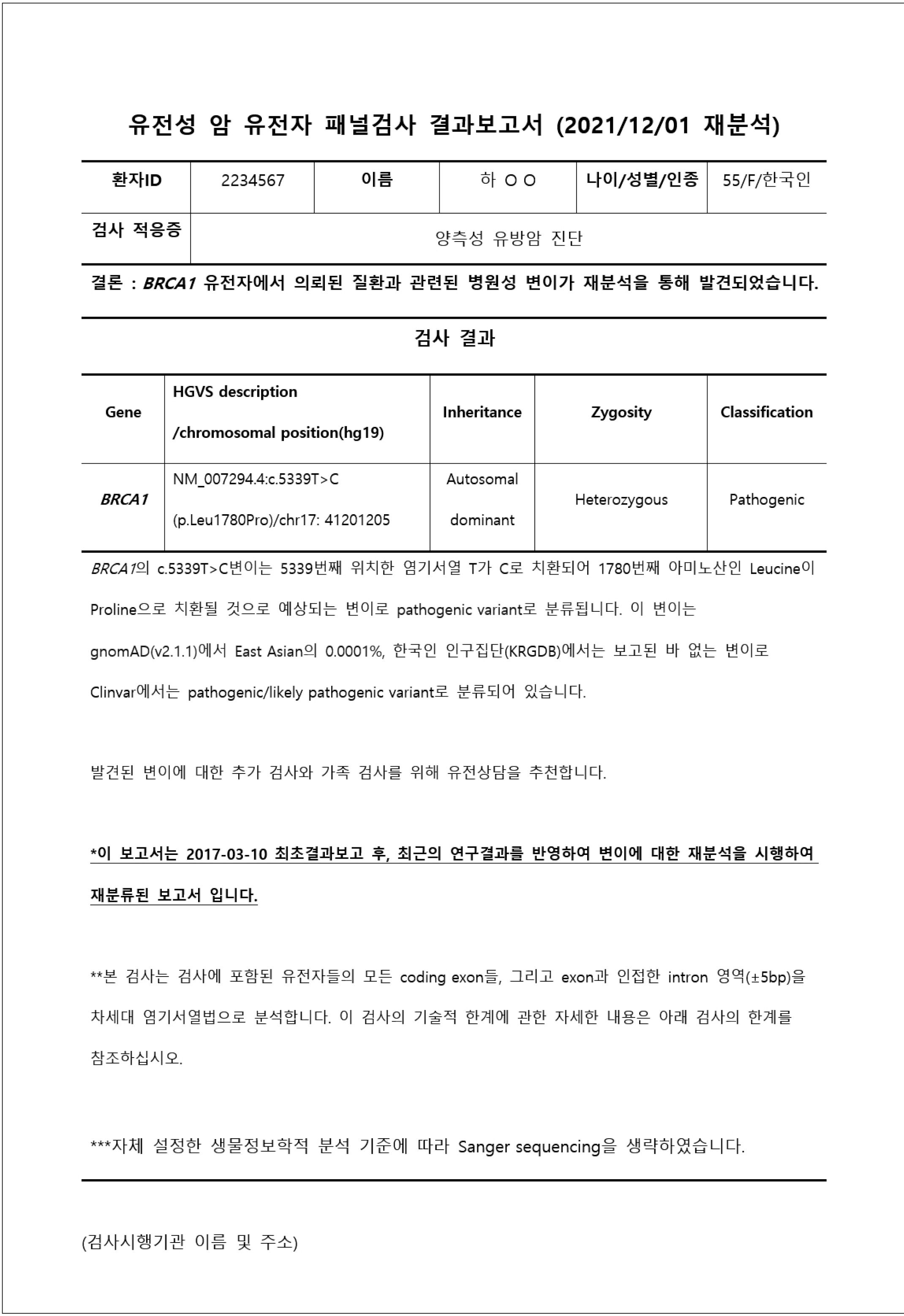Lab Med Online.
2022 Jul;12(3):159-168. 10.47429/lmo.2022.12.3.159.
Guidelines for Genetic Counseling and Reporting of Cancer Genetic Test Results: Genetic Test for Hereditary Cancer-predisposing Syndrome Using Next-generation Sequencing
- Affiliations
-
- 1Department of Laboratory Medicine, Keimyung University Dongsan Hospital, Keimyung University School of Medicine, Daegu, Korea
- 2Department of Laboratory Medicine, Dong-A University Medical Center, Dong-A University College of Medicine, Busan, Korea
- 3Department of Cancer Biomedical Science, National Cancer Center Graduate School of Cancer Science and Policy, National Cancer Center, Goyang, Korea
- 4Department of Laboratory Medicine, National Cancer Center, Goyang, Korea
- KMID: 2538600
- DOI: http://doi.org/10.47429/lmo.2022.12.3.159
Abstract
- Genetic counseling and reporting on cancer genetic test results using next-generation sequencing (NGS) are practiced in various ways in different Korean genetic laboratories. Therefore, the Korean Society for Genetic Diagnostics has proposed guidelines for genetic counseling and reporting of NGS tests, especially for hereditary cancer-predisposing syndrome. We hope these guidelines will reduce inter-laboratory variations in reporting NGS test results and improve the quality of genetic counseling in Korea.
Keyword
Figure
Reference
-
1. National Cancer Institute. NCI dictionary of cancer terms. https://www.cancer.gov/publications/dictionaries/cancer-terms. Last accessed on Oct 2021.2. Metzker ML. 2010; Sequencing technologies - the next generation. Nat Rev Genet. 11:31–46. DOI: 10.1038/nrg2626. PMID: 19997069.
Article3. Riley BD, Culver JO, Skrzynia C, Senter LA, Peters JA, Costalas JW, et al. 2012; Essential elements of genetic cancer risk assessment, counseling, and testing: updated recommendations of the National Society of Genetic Counselors. J Genet Couns. 21:151–61. DOI: 10.1007/s10897-011-9462-x. PMID: 22134580.
Article4. National Comprehensive Cancer Network. Genetic/Familial High-Risk Assessment: Breast, Ovarian, and Pancreatic Version 2.2022. https://www.nccn.org/professionals/physician_gls/pdf/genetics_bop.pdf. Last accessed on May 2022.5. National Comprehensive Cancer Network. Genetic/Familial High-Risk Assessment: Colorectal Version 2.2021. https://www.nccn.org/professionals/physician_gls/pdf/genetics_colon.pdf. Last accessed on May 2022.6. EuroGentest Network of Excellence. Recommendations for genetic counselling related to genetic testing. https://www.verbrauchergesundheit.gv.at/gentechnik/humanm/anhang_6_eurogentest.pdf?8bgalo. Last accessed on Oct 2021.7. EuroGentest Network of Excellence. Summary of the guidelines for genetic counselling. https://www.verbrauchergesundheit.gv.at/gentechnik/humanm/anhang_6_eurogentest.pdf?8bgalo. Last accessed on Oct 2021.8. Nordic Alliance for Clinical Genomics. Clinical reporting of NGS data. https://nordicclinicalgenomics.org/assets/resources/2018-nacg-paper-clinical-reporting-benchmarking.pdf. Last accessed on Oct 2021.9. U.S. Department of Health and Human Services Food and Drug Administrations. Considerations for Design, Development, and Analytical Validation of Next Generation Sequencing (NGS)-Based In Vitro Diagnostics (IVDs) Intended to Aid in the Diagnosis of Suspected Germline Diseases. Docket No. FDA-2016-D-1270. https://www.fda.gov/regulatory-information/search-fda-guidance-documents/considerations-design-development-and-analytical-validation-next-generation-sequencing-ngs-based. Last accessed on Oct 2021.10. Smith K, Martindale J, Wallis Y, Bown N, Leo N, Creswell L, et al. General Genetic Laboratory Reporting Recommendations. https://www.acgs.uk.com/media/10758/acgs_general_genetic_laboratory_reporting_recommendations_2015.pdf. Last accessed on Oct 2021.11. Organisation for Economic Co-operation, Development. OECD Guidelines for Quality Assurance in Genetic Testing. https://www.oecd.org/sti/emerging-tech/oecdguidelinesforqualityassuranceingenetictesting.htm. Last accessed on Oct 2021.12. Green RC, Berg JS, Grody WW, Kalia SS, Korf BR, Martin CL, et al. 2013; ACMG recommendations for reporting of incidental findings in clinical exome and genome sequencing. Genet Med. 15:565–74. DOI: 10.1038/gim.2013.73. PMID: 23788249. PMCID: PMC3727274.
Article13. Rehm HL, Bale SJ, Bayrak-Toydemir P, Berg JS, Brown KK, Deignan JL, et al. 2013; ACMG clinical laboratory standards for next-generation sequencing. Genet Med. 15:733–47. DOI: 10.1038/gim.2013.92. PMID: 23887774. PMCID: PMC4098820.
Article14. Deans Z, Watson CM, Charlton R, Ellard S, Wallis Y, Mattocks C, et al. Practice guidelines for targeted next generation sequencing analysis and interpretation. https://www.acgs.uk.com/media/10789/bpg_for_targeted_next_generation_sequencing_-_approved_dec_2015.pdf. Last accessed on Oct 2021.15. Aziz N, Zhao Q, Bry L, Driscoll DK, Funke B, Gibson JS, et al. 2015; College of American Pathologists' laboratory standards for next-generation sequencing clinical tests. Arch Pathol Lab Med. 139:481–93. DOI: 10.5858/arpa.2014-0250-CP. PMID: 25152313.
Article16. Richards S, Aziz N, Bale S, Bick D, Das S, Gastier-Foster J, et al. 2015; Standards and guidelines for the interpretation of sequence variants: a joint consensus recommendation of the American College of Medical Genetics and Genomics and the Association for Molecular Pathology. Genet Med. 17:405–24. DOI: 10.1038/gim.2015.30. PMID: 25741868. PMCID: PMC4544753.
Article17. Wallis Y, Payne S, Mcanulty C, Bodmer D, Sistermans E, Robertson K, et al. Practice guidelines for the evaluation of pathogenicity and the reporting of sequence variants in clinical molecular genetics. https://www.acgs.uk.com/media/10791/evaluation_and_reporting_of_sequence_variants_bpgs_june_2013_-_finalpdf.pdf. Last accessed on Oct 2021.18. Ellard S, Baple EL, Callaway A, Berry I, Forrester N, Turnbull C, et al. ACGS Best Practice Guidelines for Variant Classification in Rare Disease 2020. https://www.acgs.uk.com/media/11631/uk-practice-guidelines-for-variant-classification-v4-01-2020.pdf. Last accessed on Oct 2021.19. Miller DT, Lee K, Chung WK, Gordon AS, Herman GE, Klein TE, et al. 2021; ACMG SF v3.0 list for reporting of secondary findings in clinical exome and genome sequencing: a policy statement of the American College of Medical Genetics and Genomics (ACMG). Genet Med. 23:1381–90. DOI: 10.1038/s41436-021-01172-3. PMID: 34012068.
Article20. Peshkin BN, Isaacs C. Genetic testing and management of individuals at risk of hereditary breast and ovarian cancer syndromes. https://www.uptodate.com/contents/genetic-testing-and-management-of-individuals-at-risk-of-hereditary-breast-and-ovarian-cancer-syndromes. Last accessed on Oct 2021.21. Health Insurance Review & Assessment Service. 2022 National Health Insurance Corporation Medical Fee. https://www.hira.or.kr/ebooksc/ebook_688/ebook_688_202203170916571660.pdf. Last accessed on May 2022.22. Korean Breast Cancer Society. The 9th Korean Clinical Practice Guideline for Breast Cancer, 2021. https://www.kbcs.or.kr/journal/file/211104_2.pdf. Last accessed on Oct 2021.23. National Comprehensive Cancer Network. NCCN Guidelines Kidney Cancer. https://www.nccn.org/professionals/physician_gls/pdf/kidney.pdf. Last accessed on Oct 2021.24. VHL Alliance. VHLA Suggested Active Surveillance Guidelines. https://www.vhl.org/wp-content/uploads/2020/10/Active-Surveillance-Gui-delines-2020.pdf. Last accessed on Oct 2021.25. Li MM, Datto M, Duncavage EJ, Kulkarni S, Lindeman NI, Roy S, et al. 2017; Standards and guidelines for the interpretation and reporting of sequence variants in cancer. J Mol Diagn. 19:4–23. DOI: 10.1016/j.jmoldx.2016.10.002. PMID: 27993330. PMCID: PMC5707196.
Article26. Matthijs G, Souche E, Alders M, Corveleyn A, Eck S, Feenstra I, et al. 2016; Guidelines for diagnostic next-generation sequencing. Eur J Hum Genet. 24:2–5. DOI: 10.1038/ejhg.2015.226. PMID: 26508566. PMCID: PMC4795226.
Article27. Claustres M, Kožich V, Dequeker E, Fowler B, Hehir-Kwa JY, Miller K, et al. 2014; Recommendations for reporting results of diagnostic genetic testing (biochemical, cytogenetic and molecular genetic). Eur J Hum Genet. 22:160–70. DOI: 10.1038/ejhg.2013.125. PMID: 23942201. PMCID: PMC3895644.
Article28. den Dunnen JT, Dalgleish R, Maglott DR, Hart RK, Greenblatt MS, McGowan-Jordan J, et al. 2016; HGVS recommendations for the description of sequence variants: 2016 update. Hum Mutat. 37:564–9. DOI: 10.1002/humu.22981. PMID: 26931183.
Article29. Need AC, Shashi V, Schoch K, Petrovski S, Goldstein DB. 2017; The importance of dynamic re-analysis in diagnostic whole exome sequencing. J Med Genet. 54:155–6. DOI: 10.1136/jmedgenet-2016-104306. PMID: 27899421.
Article30. Wenger AM, Guturu H, Bernstein JA, Bejerano G. 2017; Systematic reanalysis of clinical exome data yields additional diagnoses: implications for providers. Genet Med. 19:209–14. DOI: 10.1038/gim.2016.88. PMID: 27441994.
Article31. Costain G, Jobling R, Walker S, Reuter MS, Snell M, Bowdin S, et al. 2018; Periodic reanalysis of whole-genome sequencing data enhances the diagnostic advantage over standard clinical genetic testing. Eur J Hum Genet. 26:740–4. DOI: 10.1038/s41431-018-0114-6. PMID: 29453418. PMCID: PMC5945683.
Article




